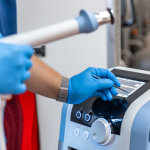Table of contents
- What is ISO 13485?
- Key Requirements of ISO 13485
- ISO 13485 Certification Process
- How Long Does Certification Take?
- Does ISO 13485 Help with CE Marking?
- Does ISO 13485 Replace Other Certifications?
- Why Choose GCB for ISO 13485 Certification?
- Benefits of ISO 13485 Certification
- Risks of Not Implementing ISO 13485
What is ISO 13485?
ISO 13485 outlines the requirements for a QMS covering the entire lifecycle of medical devices, including design, production, installation, and post-market servicing. It emphasizes a process-based approach, risk management, and regulatory compliance throughout all operational stages.
Key Requirements of ISO 13485
- Establishment of a comprehensive QMS covering the full product lifecycle
- Maintenance of documented procedures and technical documentation
- Ongoing process monitoring, data analysis, and continuous improvement
- Risk management integrated at every stage
- Full traceability of medical devices
ISO 13485 Certification Process
- Application submission and offer preparation
- Contract signing with the certification body
- Optional preliminary audit (Stage 0)
- Certification audit – Stage I (document review) and Stage II (on-site audit)
- Issuance of certificate
- Annual surveillance audits
How Long Does Certification Take?
The ISO 13485 certification process typically takes 1 to 3 months, depending on the size of the company and complexity of its processes.
Does ISO 13485 Help with CE Marking?
Yes – compliance with ISO 13485 supports the quality management system requirements outlined in MDR/IVDR, helping facilitate the CE conformity assessment process.
Does ISO 13485 Replace Other Certifications?
No – it does not replace other certifications but can support and complement regulatory compliance across multiple jurisdictions.
Why Choose GCB for ISO 13485 Certification?
- Extensive experience in the medical device industry
- Transparent and consistent certification process
- Customized support tailored to client needs
- Highly qualified and objective auditors
Benefits of ISO 13485 Certification
- Compliance with international regulations
- Improved safety and quality of medical devices
- Increased trust from customers and business partners
- Enhanced risk management capabilities
Risks of Not Implementing ISO 13485
- Restricted access to EU and other key markets
- Lower product quality and increased risk of medical incidents
- Lack of process control and traceability
- Loss of trust from customers and stakeholders



















